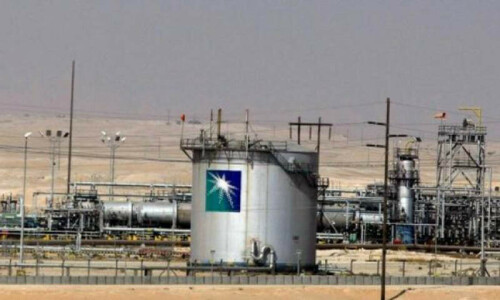ISLAMABAD: The National Electric Power Regulatory Authority (Nepra) on Monday withheld countrywide applicability of Rs1.27 per unit increase in uniform electricity tariff, saying it lacked legal authority for want of quorum.
Two members of Nepra –– representing Balochistan and Punjab –– conducted a public hearing on the request of Power Division for uniform applicability of Rs1.27 per unit average increase in tariff approved by the Economic Coordination Committee (ECC) of the Cabinet.
When asked if two out of five members of the regulator could take up such a major question, Nepra’s member Punjab, Saifullah Chattah, said even a single representative can hold a hearing but the final decision has to be made by no less than three members, including a chairman or vice chairman.
He said proceedings of the hearing had been recorded and final determination would be made on the basis of records and evidence once the quorum is complete. Rehmatullah Baloch from Balochistan was the other member on the bench.
Nepra’s case officer Sajid Akram questioned the ground for a uniform tariff under a single application of the Power Division saying the 10 distribution companies did not have consolidated accounts. Also, three of the distribution companies (Discos) were governed under the multi-year tariff while seven others had annual regimes.
Zargham Eshaq Khan of Power Division told the hearing that Nepra had completed the individual tariff determinations of all Discos in September with a consolidated Rs3.82 per unit increase to meet additional revenue requirement of Rs396 billion.
On this basis, the ECC deliberated on the subject for about two months to conclude that a Rs1.27 average increase in consumer tariff be made without affecting those consuming up to 300 units per month. He said the tariff increase for high-end domestic consumers, big commercial and power and fertiliser sector would range from 20 paisa per unit to Rs2.60 per unit and will vary between Discos who would cross subsidise each other.
A participant said this would mean the efficient and well-performing companies; particularly those in Punjab, would have no motivation to do good to their consumers while the inefficient companies would have no incentive to improve their performance when they would be treated fairly and finance each other.
Zargham said the tariff adjustment was part of the energy policy and plan approved by the Council of Common Interests (CCI) keeping in mind the socio-economic policy objectives. He informed that the tariff for agricultural consumers was set flat at Rs5.35 per unit instead of higher rates earlier while Rs3 per unit industrial support package was protected in addition to a flat $7.5 cent per unit rate for five zero-rated export sectors.
This was achieved by putting on hold until end of the year the recovery of Rs146bn from consumers payable to the provinces on account of net hydel profit. Instead, Wapda was instructed to raise this amount from the commercial banks to pay provinces.
In addition, the Power Division is committed to recover Rs140bn through recovery of arrears and efficiency gains. Practically, the Rs1.27per unit tariff increase would generate the remaining Rs110-120bn to the power companies.
The representative of textile sector said the sector was facing problems due to depreciation of the rupee against dollar. The Power Division official responded that the division would move a summary soon to the ECC, recommending to fix a date for exchange rate for issuing electricity bill to the textile sector in order to overcome that issue.
The K-Electric representative questioned whether the government would set a uniform tariff for KE consumers or not, to which the Power Division assured that uniform rate would also be notified for KE soon after the tariff notification for other Discos.
Outside the hearing, Barrister Asghar Khan said the question of quorum was genuine for determination but hearing was competently conducted by the two-member bench. He said the Power Division’s petition had a number of deficiencies as it could not be filed without compilation of consolidated accounts of all Discos. Moreover, the common ownership of the Discos cannot be ascertained as their shareholding structures differ.
He said uniform tariff was against the principles as set out in the Nepra Act, which calls for the prudently incurred cost for each individual Disco and not collectively. He said it would result in windfall for certain companies at the cost of consumers.
Published in Dawn, November 27th, 2018











































